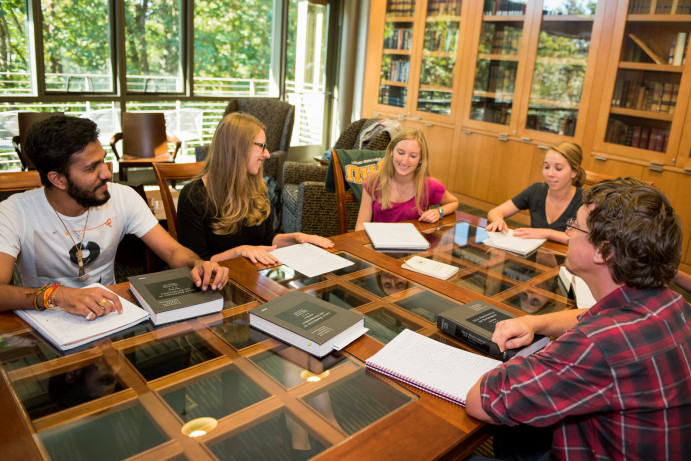Lawyering Program Policies

Lawyering Program Policies
Honor Code and Procedure (What’s What: Student Handbook)
A. GRADING PHILOSOPHY:
As your only skills course in the first year of law school, Lawyering will teach a wide range of skills you will need in practice. Lawyering is a required course in which students may receive a grade of Honors Pass, High Pass, Pass, or No Pass (F). Students will not be graded on a curve. The basic competencies of legal research, reasoning, and writing are the most fundamental skills a lawyer possesses. Consequently, all students should reach a level of competency expected of practicing lawyers. Because this course teaches the fundamental skills every attorney needs, students would be disadvantaged to be graded on a curve and ranked individually. Instead, all students have the opportunity to achieve excellence.
While your goal in some courses may be short term—that is, a good grade—Lawyering requires a somewhat longer perspective. You are building a solid foundation for your entire legal career (including your career as a law student), when you develop your reasoning and communication skills. The skills you learn in Lawyering will not only help you in practice, they will also help you excel on your law school exams. Your hard work now will pay off handsomely when you take law school exams, when you get your first summer clerking job, and when you accept your first attorney position after graduation.
Lawyering skills are the ones you will use every day in practice. You will learn many skills an attorney needs such as critical reading and thinking, professionalism, cooperation, and peer learning. Many times this year, you will work with other students. In Lawyering you can focus all your energy on learning these skills instead of worrying about your individual rank in the class. Your Lawyering course will be a tremendous amount of work. We trust you will recognize the rewards.
B. INDIVIDUAL WORK:
The Lewis & Clark Honor Code is an important document to the law school community. Read it on line in What’s What. The Honor Code explains that the law school prohibits plagiarism. Plagiarism includes the failure to adequately credit sources when paraphrasing ideas, as well as blatant “lifting” of text. This applies to both published and unpublished material (including the work of other students). Read the plagiarism chapter in this Supplement for more information.
Every year, questions arise concerning the degree to which students may work with one another on their assignments. General guidelines follow. You should address questions to your professor. If you are in doubt, ask.
1. Thinking
We encourage open discussion of ideas and legal theories. Therefore, we encourage you to discuss ideas with your Lawyering classmates. You may not ask your Lawyering classmates or anyone else for answers to your assignments.
2. Researching
You may explain your research process to fellow Lawyering classmates and research together when your professor allows. You may not, however, give another student the answer itself, nor may you mark the pages where the answer is found.
3. Writing
All written work must be a product of your individual effort. Passing off another’s work as your own is plagiarism. You may ask your professor or any Teaching Fellow to review your Lawyering assignments, outlines, drafts, and final documents. You may also ask non-lawyers or non-legal trained friends or relatives to proofread your work or read it for clarity, but they may not substantially revise or edit your work. In addition, those readers may not comment on your analysis or content. Finally, you must not ask to see another student’s work or share your work unless directed to do so by your professor.
4. Consequences
A student who violates any of these rules may receive a failing grade for both semesters of Lawyering and may also be subject to further proceedings under the Honor Code. Honor Code sanctions range from written reprimand to expulsion. Failure to report a suspected violation may also be a violation of the Honor Code.
C. LIBRARY:
1. A student shall not take a book outside the library without first checking the book out.
2. A student shall not hoard books. Hoarding means removing a book from its assigned shelf space for more than three hours at a time. This includes intentionally reshelving a book in an improper location. Hoarding also includes possessing more than six library books at any time.
3. A student shall not deface books.
The Library staff is a helpful resource. The staff’s willingness to assist you is directly related to your patience and willingness to observe the library rules.
D. DEADLINES:
Your professor will explain how, when, and where to hand in assignments. To assure confidentiality, students may not pick up graded papers for other students. No classes may be skipped in order to complete Lawyering assignments.
E. ORIGINALS AND COPIES:
All papers must be word-processed. In addition to the copy you turn in, you must be able to produce an additional copy of each assignment.
F. ATTENDANCE:
1. Students must regularly attend class to receive credit in the course.
2. Students should inform the professor ahead of time of necessary absences.
3. Students who miss class are responsible for finding out what was covered, collecting any handouts, and for completing any in-class work.

G. ASSIGNMENTS:
1. Satisfactory completion of all assignments, including in-class exercises, is required to receive credit for Legal Analysis and Writing.
2. Many required assignments will be collected and critiqued, but not graded.
H. TIMELINESS:
1. All work is due on the assigned day at the assigned time.
2. Any requests for extensions must be submitted in strict accordance with the professor’s requirements.
3. In extraordinary circumstances, a student may request an extension no later than 24 hours after a paper is due. Such a request must include an explanation as to why the request was not made in a timely manner.
I. CONSEQUENCES:
1. All students are expected to comply with the requirements set forth above. Failure to comply may result in receiving a grade of No Pass (F) for the semester. All students must receive credit for both Lawyering I and Lawyering II to graduate.
2. A professor may require a student to rewrite any assignment that is not of satisfactory quality.
3. If a paper is handed in late the grade may be reduced one or more grade levels. For repeated offenses, the student may receive a grade of No Pass (F) for the semester.

Lawyering is located in Wood Hall on the Law Campus.
MSC: 51
email tvj@lclark.edu
voice 503-768-6637
fax 503-768-6671
Director Steve Johansen
Lawyering
Lewis & Clark Law School
10101 S. Terwilliger Boulevard MSC 51
Portland OR 97219